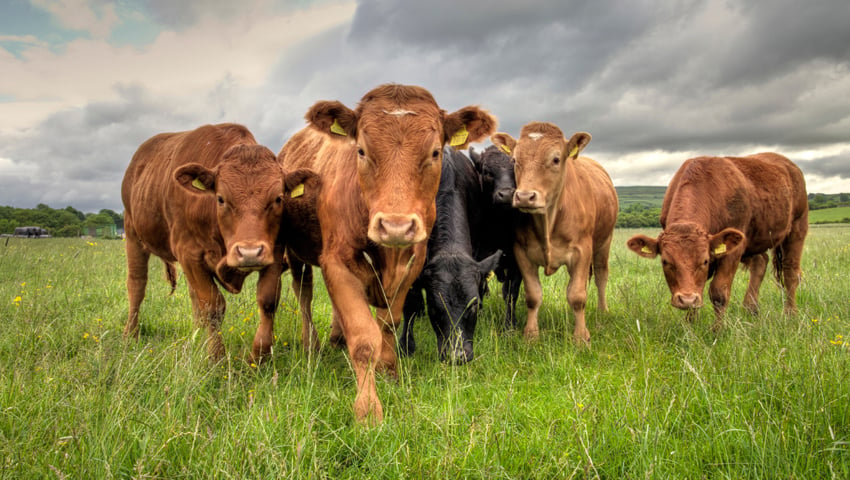This week, 8.9ha Editor-in-Chief, ffinlo Costain, delivered a keynote speech at Beef Day of the British Cattle Breeders’ Club Conference.
His theme was “ecological efficiency”, which he said was essential for “ecological security”.
He said, “Systems not delivering multiple ecological and agricultural outcomes together should be considered inefficient in any future scenario. Industrialised farm systems focused primarily on volume, or volume and emissions reduction, should be considered wasteful because they fail to unlock the ecological potential of the livestock they are rearing, while at the same time loading ecological debt onto the world around them.”
For context, Costain continued, “We are facing into a climate crisis – which threatens ecological insecurity, locally and globally – and as we peer into the coming storm there are two competing futures, in terms of food systems. The cow is at the centre of them both. There is the industrialised, land sparing, emissions-centric future promoted by Bill Gates and George Monbiot – with lab-produced protein, cellular meat, and with farming squeezed into ever smaller parcels of land.
“In this future, the cow is the villain – recruited into this role by emissions-centric life cycle analyses – which are obsessed-over by many scientists and by the policy-makers and mainstream media that follow them. Where the cow exists at all, it’s been demonized, and shuffled into highly-industrialised fully indoor systems.”
By contrast, Costain said, “And then there’s the agroecological future – where food is produced in partnership with nature, rather than despite it – where land delivers multiple outcomes – food, fibre, forestry and natural capital: together – where nations become more independent and resilient – where we achieve ‘ecological security’ and ‘ecological efficiency’ and begin to turn back the most dangerous aspects of our accelerating climate crisis.
“In this future, the cow; the grazing cow – ideally reared in adaptive multi-paddock systems – is the hero; the beating heart of that multi-function land use, that enables continual regeneration.
“At the heart of the agroecological future – the regenerative future – is the knowledge that climate change is only part of the ecological crisis – and that we can’t address this emergency while continuing to burn the fossil fuels (no matter how efficiently) that have previously enabled our industries to thrive and grow.”
Warming to his topic of “ecological security”, Costain explained that this means, “mitigating and adapting to global heating – it means regenerating biological diversity, the fundamental building blocks of nature – it means ensuring that everyone has access to high quality nutritious meals, and that our food system properly rewards producers and funds rural development.”
But critically, he said, “Ecological security also recognises the interface between ecology, food production and national and global security. Conflict will increase if ecological insecurity deepens. Competition for basic commodities will rise and prices will follow. Trade routes will become more vulnerable to increasingly extreme weather -migration levels will rise – and these combined factors will place ever greater pressure on richer nation state, increasingly in competition with each other for basic commodities.”
He said, “Our reliance on global trade makes us vulnerable – and so we need to rebuild natural resilience. Now, just as nations are turning to renewables for greater energy security – we must turn to regenerative farming for ecological security. We need to prioritise the health of our soils. Soil function – the restoration of Earth’s natural systems – the redesign of our food supply chains – these must become national security priorities. Regeneration is essential. And the cow – managed by the agroecological farmer – is the ecosystem engineer that makes this possible.”
Costain explained, as he did in his TEDx Talk from 2022, the enormous ecological value of regenerative managed cattle.
He described adaptive multi-paddock grazing as an example of ecological efficiency, and contrasted this with the ecological inefficiency of fully indoor fossil fuel dependent systems. These systems he said produced only milk, while externalizing ecological debt and failing to unleash the cow’s power as an ecosystem engineer.
He addressed the question of what cattle breeders can do.
He said, “You’ve got all the skills – you’ve got more knowledge in this area than anyone’s ever had – you can choose to lead in this emerging and new market of breeding for regeneration. The world’s changing – so we need to change too. Breeding is as important to regenerative agriculture as it is to mainstream farming – but regenerative outcomes and values are different.
“Instead of low methane cows, rapid growth and high production – regenerative farmers look for resilience, intelligence, good nurturing and mothering skills – they need stock that are easy to handle – that are robust and healthy – can self-medicate from diverse leys and hedgerows – cows that can thrive on rougher forage and in outwintering systems – smaller-framed animals that produce lower volume but higher nutritional quality and remarkable natural capital functioning.”
Costain explained that 8point9.com exists to support a practical, investable and inclusive transition to agroecological land use and referred to recent interviews with regenerative farmers and breeders: Rob Havard from Phepson Angus, Phyllis van Amburgh from Dharma Lea, Sophie Wilson from Starveall Dairy and Silas Hedley-Lawrence from FAI Farms. (These interviews are available in the 8.9 TV section of this website, and on 8.9’s Newsweek podcast, which is broadcast on the Farm Gate channel.)
Costain concluded that, “We’re now emerging into the end game for volume-focussed emissions-centric production. It may not quite feel like it yet – but these systems cannot continue because the flawed logic on which their economic model is built is crumbling. Ecological security demands a fundamental transition to agroecological agriculture – food, fibre, climate and nature: together.”
*****
